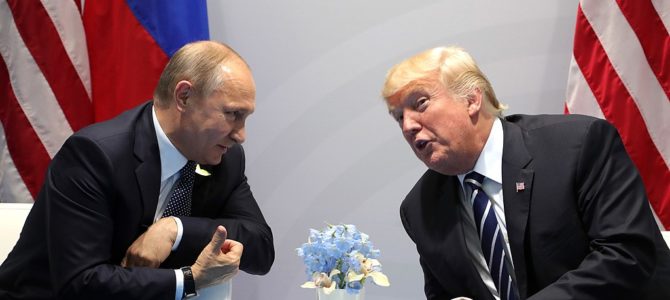
Donald Trump’s meeting with Russian President Vladimir Putin at the G-20 summit produced more than just a beehive’s worth of media buzzing. A Syrian ceasefire agreement also emerged. Putin and Trump, with the help of Jordan, apparently reached an agreement for a ceasefire in three areas in southern Syria, two of which border Jordan and a third along the Israeli border.
But don’t hold your breath waiting for this to culminate in some sort of peaceful resolution, or even in a durable ceasefire. We’ve been down this road before, folks.
The ceasefire went into effect on Sunday and as of Monday the United Nation’s special envoy for Syrian peace talks said it’s generally being respected, although there have been some “teething problems,” by which we can assume he means sporadic fighting. The ceasefire also happens to coincide with the latest round (the seventh, to be exact) of indirect peace talks between representatives of the Syrian government and some, but not all, of the opposition leaders.
We’ve Heard This Before, to No Avail
This all sounds well and good, except there’s a problem, or rather a number of problems, that ought to make us less than hopeful. The last four attempts at establishing a ceasefire in Syria were resounding failures. Three came apart in the span of months and the fourth fell apart before it was ever enforced. Both sides in this civil war (the regime of Bashar al Assad and the rebel groups seeking to oust him) claim that the responsibility for failure lies with the other.
In the most recent ceasefire attempt, which was brokered in May by Russia, Iran, and Turkey, several of the rebel groups rejected the plan. There were also disagreements over which country’s forces would ultimately patrol and enforce various de-escalation zones.
Another glaring problem with past ceasefires has been that they allow for continued fighting against ISIS. This, of course, makes sense. However, Russia, which has been providing the Assad regime military support since 2015, has used this as a pretext to launch airstrikes, most likely against Syrian opposition groups, while claiming to target ISIS fighters. That claim has been difficult to confirm and highly suspect, since Moscow has shown little interest in fighting ISIS since it arrived on the scene two years ago.
On top of that, the seventh and most recent attempt at peace talks have little chance of bringing about a peaceful resolution to the conflict. One major difficulty with the previous six peace talks was that not all of the involved parties have been invited to the table. Of course, ISIS was excluded (there is almost no chance of them participating anyway). The militant Islamist rebel group formerly known as the al Nusra Front was also not at the table.
The reasons for this make sense. No one wants to legitimize the radical group with former ties to al-Qaeda. But it also means no meaningful peace can be found if all the belligerents are not involved. Yet the Trump administration is being led down the garden path by Russia and Syria, repeating the very same policy mistakes of the Obama administration. After the past six years, the United States ought to know better.
The Russians Have Proven They’re Not Reliable
Let’s put aside all of the evidence worldwide that Russia isn’t an honest broker and focus solely on the country’s behavior in Syria since the civil war began there in 2011. Moscow has continually engaged in peace talks and ceasefires with no discernible intention of maintaining peace or abiding by ceasefire rules.
There’s also the little problem of the Syrian chemical weapons crisis in 2013. After President Obama let the Assad regime cross his chemical weapons red line, Russia agreed, ever so magnanimously, to broker the transfer of the regime’s banned weapons to the international community for destruction. Yet the deal didn’t allow for the use of force or the automatic imposition of sanctions in the event of Syrian violations. Russia insisted on this as part of its shell game.
We all saw how that worked out. Since the supposed destruction of Syria’s chemical weapons in 2014, the Assad regime has continued to launch chlorine and sarin gas attacks on civilians, drawing on a supposedly non-existent stockpile of chemical weapons.
These facts alone should be enough to convince the Trump administration that the Russians are not a reliable partner in diffusing or de-escalating the Syrian civil war. Yet here we are. Obama’s secretary of State, John Kerry, made a spectacle of himself by repeatedly returning to the Russians with renewed hope that they would be partners in ending the civil war in Syrian. Now the Trump administration appears set to follow in Kerry’s footsteps.
So Now We’re Essentially Fighting a Proxy War
After Trump’s meeting with Putin last week, Secretary of State Rex Tillerson went so far as to say, “By and large, our objectives [in Syria] are exactly the same,” echoing Kerry, who often expressed the same misguided sentiment. Nothing could be further from the truth. One might even say that the United States and Russia have opposite interests in Syria. One might even say that the United States and Russia are now fighting a proxy war there.
Moscow is determined to see Assad remain in power, cares little about the fate of ISIS except in so far as it helps or hurts the Assad regime, has no interest in or incentives to pursue a real and lasting peace, and has aided in putting down the opposition in the harshest ways. Russia also cares little about humanitarian issues or the use of chemical weapons. But sure, Rex, our objectives just about line up.
Trump and his administration are singing the same tune as the Obama team on Syria. What is it they say again about a person who keeps repeating the same action while expecting a different result?
A version of this article appeared as the lead essay in our foreign policy email newsletter, INBOUND. Subscribe here.









